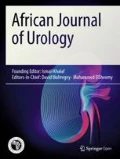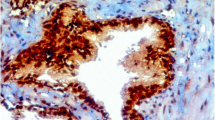Abstract
Objectives
Estrogen receptors are believed to play a significant role in the pathogenesis of prostate carcinoma (PCa). The aim of this study is to evaluate the expression of ER-α and ER-β in human benign and malignant prostatic tissue.
Patients and Methods
The archival materials of 100 prostatic specimens (65 PCa, 35 BPH) were collected from the Department of Pathology, King Abdul-Aziz University Hospital, Jeddah, Saudi Arabia. Seven PCa cases contained foci of high-grade prostate intraepithelial neoplasia (HGPIN). Immunohistochemistry was used to test the protein expression of ER-α and ER-β utilizing monoclonal mouse antihuman antibodies.
Results
Among the 65 cases of PCa, ER-α was expressed in 3 cases (4.6%) in epithelial cells and 4 cases (6.1%) in stromal cells. ER-α was not expressed in any of the HGPIN foci. Additionally, ER-α was not expressed in either luminal or basal cells in any of the 35 BPH cases. However it was expressed in 4 cases (11.4%) in stromal cells of BPH. In PCa, ER-β was expressed in 61 cases (93.8%) and 35 cases (53.8%) in the epithelial and stromal cells respectively. ER-β was expressed only in 2 cases (28.5%) out of 7 HGPIN foci. It was expressed in 33 cases (94.3%) of epithelial and stromal cells of BPH.
Conclusion
The majority of PCa and BPH exhibited nuclear immunoreactivity for ER-β in both tumor and stromal cells and they are usually negative for ER-α. There is probably partial loss of ER-β in HGPIN. ER-β may have a role in the process of prostatic hyperplasia and malignancy.
Similar content being viewed by others
References
Richardson AM, Woodson K, Wang Y, Rodriguez-Canales J, Erickson HS, Tangrea MA, et al. Global expression analysis of prostate cancer-associated stroma and epithelia. Diagn.Mol.Pathol. 2007;16(4):189–197.
Black RJ, Bray F, Ferlay J, Parkin DM. Cancer incidence and mortality in the European Union: cancer registry data and estimates of national incidence for 1990. Eur J Cancer. 1997 Jun;33(7):1075–1107
Greenlee RT, Murray T, Bolden S, Wingo PA. Cancer statistics, 2000. CA Cancer.J.Clin. 2000; Jan–Feb;50(1): 7–33.
Jemal A, Thomas A, Murray T, Thun M. Cancer statistics, 2002. CA Cancer.J.Clin. 2002; Jan–Feb;52(1):23–47.
Carter HB, Pearson JD, Metter EJ, Chan DW, Andres R, Fozard JL, et al. Longitudinal evaluation of serum androgen levels in men with and without prostate cancer. Prostate. 1995; Jul;27(1):25–31.
Henderson BE, Ross RK, Pike MC, Casagrande JT. Endogenous hormones as a major factor in human cancer. Cancer Res. 1982; Aug;42(8):3232–3239.
Heracek J, Richard H, Martin H, Luboslav S, Jana S, Jitka K, et al. Tissue and serum levels of principal androgens in benign prostatic hyperplasia and prostate cancer. Steroids. 2007; Apr;72(4):375–380.
Chang WY, Prins GS. Estrogen receptor-beta: Implications for the prostate gland. Prostate. 1999; Jul 1;40(2):115–124.
Ho SM. Estrogens and anti-estrogens: Key mediators of prostate carcinogenesis and new therapeutic candidates. J.Cell.Biochem. 2004; Feb 15;91(3):491–503.
Risbridger GP, Ellem SJ, McPherson SJ. Estrogen action on the prostate gland: A critical mix of endocrine and paracrine signaling. J.Mol.Endocrinol. 2007;39(3–4):183–188.
Singh PB, Matanhelia SS, Martin FL. A potential paradox in prostate adenocarcinoma progression: Oestrogen as the initiating driver. Eur.J.Cancer. 2008;44(7):928–936.
Bonkhoff H, Fixemer T, Hunsicker I, Remberger K. Estrogen receptor expression in prostate cancer and premalignant prostatic lesions. Am.J.Pathol. 1999; Aug;155(2):641–647.
Fixemer T, Remberger K, Bonkhoff H. Differential expression of the estrogen receptor beta (ERbeta) in human prostate tissue, premalignant changes and in primary, metastatic and recurrent prostatic adenocarcinoma. Prostate. 2003; Feb 1;54(2):79–87.
Leav I, Lau KM, Adams JY, McNeal JE, Taplin ME, Wang J, et al. Comparative studies of the estrogen receptors beta and alpha and the androgen receptor in normal human prostate glands, dysplasia and in primary and metastatic carcinoma. Am.J.Pathol. 2001; Jul;159(1):79–92.
Bosland MC. The role of estrogens in prostate carcinogenesis: A rationale for chemoprevention. Rev. Urol. 2005;7(Suppl 3):4–10.
Bonkhoff H, Berges R. The evolving role of oestrogens and their receptors in the development and progression of prostate cancer. Eur.Urol. 2009;55(3):533–542.
Schwartz AG, Wenzlaff AS, Prysak GM, Murphy V, Cote ML, Brooks SC, et al. Reproductive factors, hormone use, estrogen receptor expression and risk of non-small-cell lung cancer in women. J.Clin.Oncol. 2007;25(36):5785–5792.
Horvath LG, Henshall SM, Lee CS, Head DR, Quinn DI, Makela S, et al. Frequent loss of estrogen receptorbeta expression in prostate cancer. Cancer Res. 2001; Jul 15;61(14):5331–5335.
Signoretti S, Loda M. Estrogen receptor beta in prostate cancer: Brake pedal or accelerator? Am.J.Pathol. 2001; Jul;159(1):13–16.
Weihua Z, Warner M, Gustafsson JA. Estrogen receptor beta in the prostate. Mol.Cell.Endocrinol. 2002; Jul 31;193(1–2):1–5.
Ito T, Tachibana M, Yamamoto S, Nakashima J, Murai M. Expression of estrogen receptor (ER-alpha and ERbeta) mRNA in human prostate cancer. Eur.Urol. 2001; Nov;40(5):557–563.
Hall JM, McDonnell DP. The estrogen receptor betaisoform (ERbeta) of the human estrogen receptor modulates ERalpha transcriptional activity and is a key regulator of the cellular response to estrogens and antiestrogens. Endocrinology. 1999; Dec;140(12):5566–5578.
Paech K, Webb P, Kuiper GG, Nilsson S, Gustafsson J, Kushner PJ, et al. Differential ligand activation of estrogen receptors ERalpha and ERbeta at AP1 sites. Science. 1997; Sep 5;277(5331):1508–1510.
Stettner M, Kaulfuß S, Burfeind P, Schweyer S, Strauss A, Ringert RH, et al. The relevance of estrogen receptor-β expression to the antiproliferative effects observed with histone deacetylase inhibitors and phytoestrogens in prostate cancer treatment. Mol.Cancer Ther. 2007;6(10):2626–2633.
Ellem SJ, Risbridger GP. Treating prostate cancer: A rationale for targeting local oestrogens. Nat.Rev.Cancer. 2007;7(8):621–627.
Kim IY, Kim BC, Seong DH, Lee DK, Seo JM, Hong YJ, et al. Raloxifene, a mixed estrogen agonist/antagonist, induces apoptosis in androgen-independent human prostate cancer cell lines. Cancer Res. 2002; Sep 15;62(18):5365–5369.
Lau KM, LaSpina M, Long J, Ho SM. Expression of estrogen receptor (ER)-alpha and ER-beta in normal and malignant prostatic epithelial cells: Regulation by methylation and involvement in growth regulation. Cancer Res. 2000; Jun 15;60(12):3175–3182.
Neubauer BL, McNulty AM, Chedid M, Chen K, Goode RL, Johnson MA, et al. The selective estrogen receptor modulator trioxifene (LY133314) inhibits metastasis and extends survival in the PAIII rat prostatic carcinoma model. Cancer Res. 2003; Sep 15;63(18):6056–6062.
Weihua Z, Makela S, Andersson LC, Salmi S, Saji S, Webster JI, et al. A role for estrogen receptor beta in the regulation of growth of the ventral prostate. Proc.Natl. Acad.Sci.U.S.A. 2001; May 22;98(11):6330–6335.
Zhu X, Leav I, Leung YK, Wu M, Liu M, Liu Q, Gao Y, et al. Dynamic regulation of estrogen receptor-beta expression by DNA methylation during prostate cancer development and metastasis. Am.J.Pathol. 2004; Jun;164(6):2003–2012.
De Marzo AM, Platz EA, Sutcliffe S, Xu J, Grönberg H, Drake CG, et al. Inflammation in prostate carcinogenesis. Nat.Rev.Cancer. 2007;7(4):256–269.
Nelson WG, De Marzo AM, DeWeese TL, Isaacs WB, Gelmann EP, Rubin MA, et al. The role of inflammation in the pathogenesis of prostate cancer. J.Urol. 2004;172(5 II):S6–S12.
Palapattu GS, Sutcliffe S, Bastian PJ, Platz EA, De Marzo AM, Isaacs WB, et al. Prostate carcinogenesis and inflammation: Emerging insights. Carcinogenesis. 2005; Jul;26(7):1170–1181.
Schulze H, Claus S. Histological localization of estrogen receptors in normal and diseased human prostates by immunocytochemistry. Prostate. 1990;16(4):331–343.
Wernert N, Gerdes J, Loy V, Seitz G, Scherr O, Dhom G. Investigations of the estrogen (ER-ICA-test) and the progesterone receptor in the prostate and prostatic carcinoma on immunohistochemical basis. Virchows Arch.A Pathol.Anat.Histopathol. 1988;412(4):387–391.
Brolin J, Skoog L, Ekman P. Immunohistochemistry and biochemistry in detection of androgen, progesterone and estrogen receptors in benign and malignant human prostatic tissue. Prostate. 1992;20(4):281–295.
Ehara H, Koji T, Deguchi T, Yoshii A, Nakano M, Nakane PK, et al. Expression of estrogen receptor in diseased human prostate assessed by non-radioactive in situ hybridization and immunohistochemistry. Prostate. 1995; Dec;27(6):304–313.
Walton TJ, Li G, McCulloch TA, Seth R, Powe DG, Bishop MC, et al. Quantitative RT-PCR analysis of estrogen receptor gene expression in laser microdissected prostate cancer tissue. Prostate. 2009;69(8):810–819.
Hobisch A, Hittmair A, Daxenbichler G, Wille S, Radmayr C, Hobisch Hagen P, et al. Metastatic lesions from prostate cancer do not express oestrogen and progesterone receptors. J.Pathol. 1997; Jul;182(3):356–361.
Li LC, Chui R, Nakajima K, Oh BR, Au HC, Dahiya R. Frequent methylation of estrogen receptor in prostate cancer: Correlation with tumor progression. Cancer Res. 2000; Feb 1;60(3):702–706.
Erenburg I, Schachter B, Mira y Lopez R, Ossowski L. Loss of an estrogen receptor isoform (ER alpha delta 3) in breast cancer and the consequences of its reexpression: Interference with estrogen-stimulated properties of malignant transformation. Mol.Endocrinol. 1997; Dec;11(13):2004–2015.
Haqq C, Li R, Khodabakhsh D, Frolov A, Ginzinger D, Thompson T, et al. Ethnic and racial differences in prostate stromal estrogen receptor alpha. Prostate. 2005; Oct 1;65(2):101–109.
Tanaka Y, Sasaki M, Kaneuchi M, Shiina H, Igawa M, Dahiya R. Polymorphisms of estrogen receptor alpha in prostate cancer. Mol.Carcinog. 2003; Aug;37(4):202–208.
Ji Q, Liu PI, Elshimali Y, Stolz A. Frequent loss of estrogen and progesterone receptors in human prostatic tumors determined by quantitative real-time PCR. Mol. Cell.Endocrinol. 2005; Jan 14;229(1–2):103–110.
Pasquali D, Staibano S, Prezioso D, Franco R, Esposito D, Notaro A, et al. Estrogen receptor beta expression in human prostate tissue. Mol.Cell.Endocrinol. 2001; Jun 10;178(1–2):47–50.
Tsurusaki T, Aoki D, Kanetake H, Inoue S, Muramatsu M, Hishikawa Y, et al. Zone-dependent expression of estrogen receptors alpha and beta in human benign prostatic hyperplasia. J.Clin.Endocrinol.Metab. 2003; Mar;88(3):1333–1340.
Gabal SM, Habib FM, Helmy DO, Ibrahim MF. Expression of estrogen receptor-B (ER-B) in bengin and malignant prostatic epithelial cells and its correlation with the clinico-pathological features. J.Egypt.Nat. Cancer Instit. 2007;19(4):239–248.
Torlakovic E, Lilleby W, Torlakovic G, Fossa SD, Chibbar R. Prostate carcinoma expression of estrogen receptor-beta as detected by PPG5/10 antibody has positive association with primary Gleason grade and Gleason score. Hum.Pathol. 2002; Jun;33(6):646–651.
Lai JS, Brown LG, True LD, Hawley SJ, Etzioni RB, Higano CS, et al. Metastases of prostate cancer express estrogen receptor-beta. Urology. 2004;64(4):814–820.
Conforti R, Boulet T, Tomasic G, Taranchon E, Arriagada R, Spielmann M, et al. Breast cancer molecular subclassification and estrogen receptor expression to predict efficacy of adjuvant anthracyclines-based chemotherapy: A biomarker study from two randomized trials. Ann.Oncol. 2007;18(9):1477–1483.
Yamashita H, Yando Y, Nishio M, Zhang Z, Hamaguchi M, Mita K, et al. Immunohistochemical evaluation of hormone receptor status for predicting response to endocrine therapy in metastatic breast cancer. Breast Cancer. 2006;13(1):74–83.
Fujimura T, Takahashi S, Urano T, Ijichi N, Ikeda K, Kumagai J, et al. Differential expression of estrogen-related receptors β and γ (ERRβ and ERRγ) and their clinical significance in human prostate cancer. Cancer Sci. 2010;101(3):646–651.
Author information
Authors and Affiliations
Corresponding author
About this article
Cite this article
Al-Maghrabi, J.A., Hassan, T.M., Abdel-Meguid, T.A. et al. Expression of estrogen alpha and beta receptors in prostate cancer and hyperplasia: Immunohistochemical analysis. Afr J Urol 16, 79–87 (2010). https://doi.org/10.1007/s12301-010-0018-3
Received:
Accepted:
Published:
Issue Date:
DOI: https://doi.org/10.1007/s12301-010-0018-3




